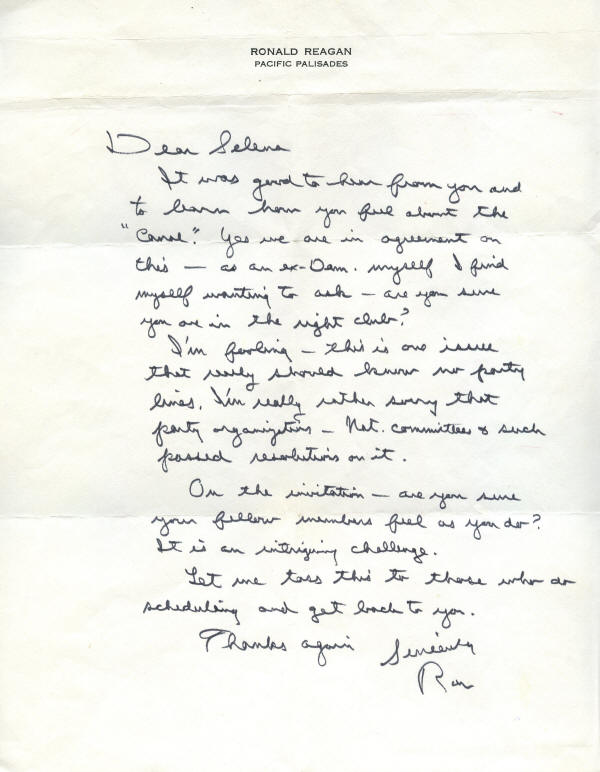
729301
Ronald Reagan
“ . . . as an ex-Dem. myself I find myself wanting to ask—are you sure you are in the right club? . . .
On the invitation—are you sure your fellow members feel as you do? It is an intriguing challenge.”
Ronald Wilson Reagan, 1911–2004. 40th President of the United States. Excellent content Autograph Letter Signed, Sincerely, Ron, one page, 8½” x 11”, on personal stationery, Pacific Palisades [California], no date [November 8, 1977]. With original envelope addressed by Reagan.
Reagan writes to Selena Walters Lamm, who had invited him to speak to her Democratic club, and expresses his agreement with her opposition to the Panama Canal treaty. In full: “It was good to hear from you and to learn how you feel about the ‘canal.’ Yes we are in agreement on this—as an ex-Dem. myself I find myself wanting to ask—are you sure you are in the right club? / I’m fooling—this is one issue that really should know no party lines. I’m really rather sorry that party organizations—Nat. committees & such passed resolutions on it. / On the invitation—are you sure your fellow members feel as you do? It is an intriguing challenge. / Let me toss this to those who do scheduling and get back to you. / Thanks again.”
The United States acquired the rights to the 10-mile-wide Canal Zone in the Hay-Bunau-Varilla Treaty in November 1903. The treaty became a source of conflict between the United States and Panama that reached its peak in 1964, when some 22 Panamanians and four American soldiers died in a student uprising over the right to fly the Panamanian flag alongside the American flag in the Canal Zone. Subsequent riots, in which some 500 people died, spurred Panama to break diplomatic ties with the United States until the United States would agree to negotiate a new treaty. Talks began shortly thereafter.
The canal issue was a sore spot for Americans, some 70% of whom opposed returning the canal to Panama. It was even more of a lightning rod issue for conservatives, among whom Reagan was prominent. When Reagan turned his attention to national issues after two terms as Governor of California, he vocally opposed the Panama Canal negotiations. In a 1975 speech he declared, “We bought it, we paid for it, it is sovereign U.S. territory and we should keep it.” Challenging incumbent President Gerald R. Ford for the Republican presidential nomination in 1976, he continued to argue that the United States should keep the canal. Ford held the opposite view.
Reagan lost the nomination to Ford, who in turn lost the election to Democrat Jimmy Carter. In September 1977, President Carter concluded the Torrijos-Carter Treaties with Panamanian General Omar Torrijos Herrera, the commander of the Panamanian National Guard who had seized power in a 1968 coup. The treaties abrogated the Hay-Bunau-Varilla Treaty, guaranteed the United States the right to defend the canal from any threat that might interfere with its continued neutral service to ships of all nations, and returned full control and primary responsibility for the canal to Panama as of midnight December 31, 1999.
The Republican National Committee adopted a resolution opposing ratification of the treaties, charging that the Carter Administration had an inconsistent and dangerously weak foreign policy. Our research shows that it also sent letters over Reagan’s signature soliciting contributions to the Committee to defeat the treaties. The United States Senate nevertheless ratified the treaties early in 1978.
Reagan later lambasted Carter as “one who is obviously getting his history from . . . middle eschelon State Department types.” Still, he wrote wrote that he had “never advocated slamming the door. I believe there is much we can do to correct things that are wrong and improve relations with Panama without bailing out. . . . [W]ith a little courage there is a right path to accomplish what needs to be done.” In a letter to Senator Barry Goldwater, Reagan wrote that he was “for continued negotiations. I’m just against these particular treaties.”
As Reagan notes in this letter, he was a former Democrat. As the head of his labor union, the Screen Actors Guild, he supported President Harry S. Truman, a Democrat, in 1948. His political views eventually shifted from liberal to conservative, and as as a television host he toured the country, becoming a spokesman for conservatism. He was elected governor of California as a Republican by a margin of a million votes in 1966 and was reelected in 1970.
Reagan presciently viewed Lamm’s invitation to speak to her Democratic club as “an intriguing challenge”—Lamm’s fellow Democrats refused to hear him.
Reagan has boldly penned this letter in black. It has expected mailing folds and is in fine condition overall. The envelope is torn on the flap from being opened but otherwise is also in fine condition.
Unframed.
_____________
This item has been sold, but
click here to see other
Presidents and First Ladies items
that we are offering.



